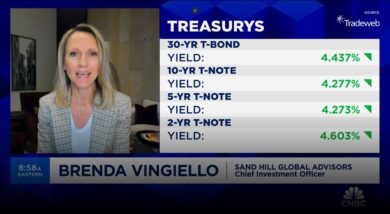Sand Hill's Chief Investment Officer, Brenda Vingiello, CFA, joins Jenny Harrington on “Halftime Report” to go over their most recent portfolio moves. Brenda's commentary begins

Exercising Options Now That You’re Out from Under AMT
We regularly work with entrepreneurs and tech employees who benefit from Incentive Stock Options (ISOs) and also often are impacted by Alternative Minimum Tax (AMT); but the relatively new tax law from 2017 offers some important related changes to know about that could positively affect you if you choose to exercise your ISOs this year.
While not as common as Restricted Stock Units (RSUs) or Non-Qualified Stock Options (NQSOs), if handled properly, ISOs offer the best tax advantage when compared to these other two benefits. If you choose to exercise NQSOs or vest RSUs, you will be taxed at ordinary income tax rates based on the value of the stock on the date of your exercise or vesting, respectively. Alternatively, when considering ISOs, you have some distinct tax advantages in the form of long-term capital gains tax treatment instead of ordinary income tax if, importantly, you follow the holding requirements. You can only take advantage of long-term capital gains rates for ISOs if you hold the stock for one year (and a day) from the date of exercise and two years from the original grant date of the option. However, under previous tax law, exercising ISOs often put one at risk of incurring AMT at time of exercise. The new tax law, effective January 1, 2018, meaningfully raises AMT exemption limits which in turn could enable you to completely avoid AMT!
First, a look back at history. Alternative Minimum Tax was originally enacted in the late-1960s when the IRS discovered that too many millionaires paid no taxes at all because they used lawful deductions not available to the average taxpayer. AMT was basically designed to ensure that some level of income tax gets paid by all wealthy taxpayers. Over time, though, more and more taxpayers—many of more modest means—became subject to AMT because the applicable limits never included adjustments for inflation from what were once considered wealthy income parameters in 1969. Indeed, prior to 2018, single taxpayers with just $112,000 in income and joint filers earning $154,000 were subject to AMT.1 As incomes have grown over time, more and more taxpayers have fallen under this alternate tax regime, and this may have discouraged some people from exercising their ISOs because of the heavy AMT cost.
Before the recent new tax law, the Tax Policy Center reported that up to 5 million taxpayers were probably affected by AMT; whereas now, with new AMT rules, only about 200,000 taxpayers are likely to be impacted!2 Similar to previous tax law, taxpayers are allowed to exempt a significant amount of their income from AMT income. Under the new tax law, the maximum exemption amount in 2019 is $71,700 for single taxpayers and $111,700 for married filing jointly, up from $54,300 and $84,500 respectively under the old tax law. These exemptions then phase out as income hits certain thresholds. But here’s the really big and important change: in 2019, the exemption only starts to phase out at $510,300 in AMT income for single filers and at $1,020,600 for married taxpayers filing jointly; both thresholds are up significantly from the old rules.3 This is what is going to lead to so many fewer people paying AMT. Unfortunately, these changes are scheduled to revert to pre-Tax Act levels in 2026.
The bottom line is that employees may be able to now exercise more of their stock options before triggering this tax at all, and it should be easier to recoup any losses due to AMT through the AMT credit.
Failing to fully understand the ramifications of exercising, holding or selling your ISOs can cost you a significant amount of potential wealth that gets lost to an inefficient tax strategy. If you find that you are facing decisions around exercising your options and need some guidance, reach out to a Wealth Manager with experience!
1 www.irs.gov
2 Burman, Leonard E. “Most AMT Taxpayers Paid Lower Taxes After TCJA, Despite SALT Cap.” www.taxpolicycenter.org. 10 July 2019.
3 www.irs.gov
Articles and Commentary
Information provided in written articles are for informational purposes only and should not be considered investment advice. There is a risk of loss from investments in securities, including the risk of loss of principal. The information contained herein reflects Sand Hill Global Advisors' (“SHGA”) views as of the date of publication. Such views are subject to change at any time without notice due to changes in market or economic conditions and may not necessarily come to pass. SHGA does not provide tax or legal advice. To the extent that any material herein concerns tax or legal matters, such information is not intended to be solely relied upon nor used for the purpose of making tax and/or legal decisions without first seeking independent advice from a tax and/or legal professional. SHGA has obtained the information provided herein from various third party sources believed to be reliable but such information is not guaranteed. Certain links in this site connect to other websites maintained by third parties over whom SHGA has no control. SHGA makes no representations as to the accuracy or any other aspect of information contained in other Web Sites. Any forward looking statements or forecasts are based on assumptions and actual results are expected to vary from any such statements or forecasts. No reliance should be placed on any such statements or forecasts when making any investment decision. SHGA is not responsible for the consequences of any decisions or actions taken as a result of information provided in this presentation and does not warrant or guarantee the accuracy or completeness of this information. No part of this material may be (i) copied, photocopied, or duplicated in any form, by any means, or (ii) redistributed without the prior written consent of SHGA.
Video Presentations
All video presentations discuss certain investment products and/or securities and are being provided for informational purposes only, and should not be considered, and is not, investment, financial planning, tax or legal advice; nor is it a recommendation to buy or sell any securities. Investing in securities involves varying degrees of risk, and there can be no assurance that any specific investment will be profitable or suitable for a particular client’s financial situation or risk tolerance. Past performance is not a guarantee of future returns. Individual performance results will vary. The opinions expressed in the video reflect Sand Hill Global Advisor’s (“SHGA”) or Brenda Vingiello’s (as applicable) views as of the date of the video. Such views are subject to change at any point without notice. Any comments, opinions, or recommendations made by any host or other guest not affiliated with SHGA in this video do not necessarily reflect the views of SHGA, and non-SHGA persons appearing in this video do not fall under the supervisory purview of SHGA. You should not treat any opinion expressed by SHGA or Ms. Vingiello as a specific inducement to make a particular investment or follow a particular strategy, but only as an expression of general opinion. Nothing presented herein is or is intended to constitute investment advice, and no investment decision should be made based solely on any information provided on this video. There is a risk of loss from an investment in securities, including the risk of loss of principal. Neither SHGA nor Ms. Vingiello guarantees any specific outcome or profit. Any forward-looking statements or forecasts contained in the video are based on assumptions and actual results may vary from any such statements or forecasts. SHGA or one of its employees may have a position in the securities discussed and may purchase or sell such securities from time to time. Some of the information in this video has been obtained from third party sources. While SHGA believes such third-party information is reliable, SHGA does not guarantee its accuracy, timeliness or completeness. SHGA encourages you to consult with a professional financial advisor prior to making any investment decision.







